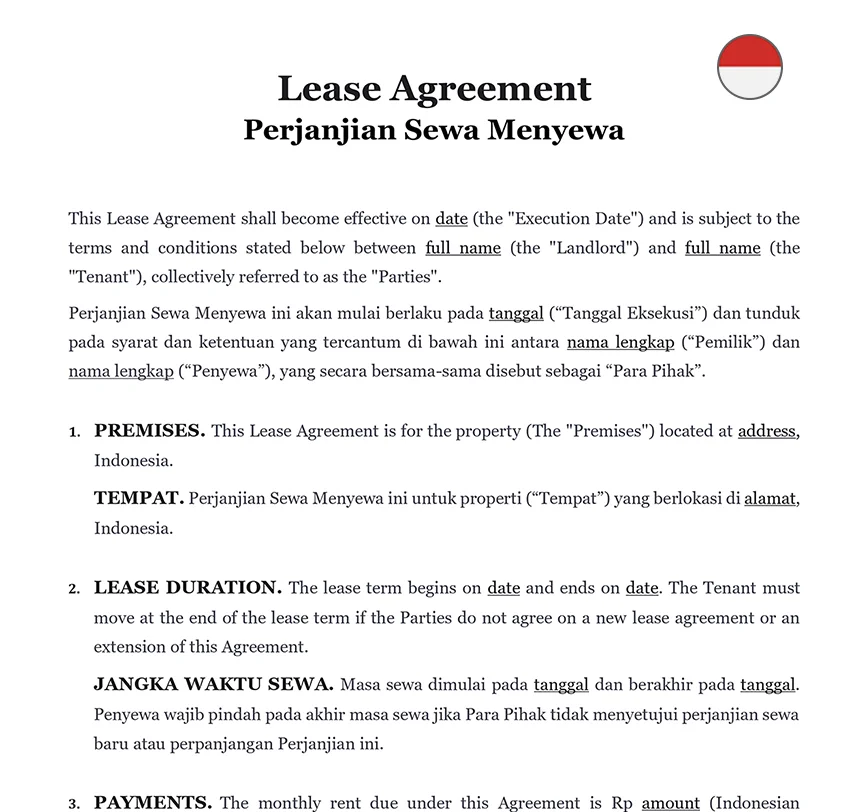Ready to use legal template
Drafted by experienced lawyers
Indonesian-English translation
Ready to use legal template
Drafted by lawyers
Indonesian-English translation
Home › Rent your property › Lease agreement
Learn more about Lease Agreement in Indonesia
A Lease Agreement is a legal contract between a landlord and a tenant, specifying the terms under which a property is rented. It outlines important details such as the rental amount, lease duration, rights and responsibilities of both parties, and conditions for terminating or renewing the lease. In Indonesia, a well-drafted Lease Agreement ensures compliance with local rental laws and protects both the landlord’s property and the tenant’s interests. It provides clarity on essential terms and prevents disputes related to payments, property maintenance, and other rental issues. Download our Lease Agreement, easy to edit in Word format, drafted by experts in both English and Indonesian.
Table of contents
-
What are the key components of a lease agreement in Indonesia?
-
Why is a lease agreement needed to rent a property in Indonesia?
-
How long should a typical lease agreement last?
-
Are there options for renewal in Indonesian law?
-
What are the prerequisites before signing a lease agreement?
-
My lease agreement is signed, what do I do next?
What are the key components of a lease agreement in indonesia?
In Indonesia, a lease agreement should typically include the following key components:
| Lease Agreement Information | |
|---|---|
| Parties Involved: | Clearly identify the landlord (lessor) and the tenant (lessee), including their full names, addresses, and contact information. |
| Property Description: | Provide a detailed description of the rented property, including its address, size, and any specific features or amenities. |
| Term of Lease: | Specify the duration of the lease, including the start date and end date, whether it's a fixed-term lease or a periodic tenancy. |
| Rent Payment Details: | Outline the amount of rent due, the frequency of payments (e.g., monthly), acceptable payment methods, and the consequences of late payments. |
| Security Deposit: | State the amount of the security deposit required, the conditions for its refund or forfeiture, and any restrictions on its use during the tenancy. |
| Rights and Responsibilities: | Clearly define the rights and obligations of both the landlord and the tenant, including maintenance responsibilities, utility payments, and rules regarding property use. |
| Maintenance and Repairs: | Specify who is responsible for maintaining and repairing the property, including routine maintenance tasks and procedures for addressing damages. |
| Termination and Renewal: | Outline the procedures for terminating the lease, including notice periods required by both parties, options for lease renewal, and any penalties for early termination. |
| Dispute Resolution: | Include provisions for resolving disputes between the landlord and tenant, such as mediation or arbitration, to avoid unnecessary legal proceedings. |
| Additional Terms and Conditions: | Include any additional terms or clauses relevant to the specific rental arrangement, such as rules regarding pets, subletting, or property alterations. |
| Compliance with Laws: | Ensure that the lease agreement complies with all relevant laws and regulations in Indonesia, including those governing landlord-tenant relationships and property rental. |
Why is a lease agreement needed to rent a property in indonesia?
A lease agreement is an essential requirement for renting a property in Indonesia as it serves multiple crucial purposes. Firstly, it acts as a legal safeguard for both landlords and tenants, providing a formal framework that delineates their rights and responsibilities. This document meticulously outlines key aspects of the tenancy, including the duration of occupancy, rent payment details, and rules governing property usage. By clarifying these terms upfront, the lease agreement minimizes the risk of disputes and misunderstandings during the rental period. Furthermore, it ensures compliance with Indonesian laws and regulations pertaining to landlord-tenant relationships and property rentals. In the event of any breaches or disagreements, the lease agreement serves as a vital reference point for resolving issues and enforcing corrective measures. In essence, the lease agreement plays a pivotal role in establishing clarity, legality, and accountability within the rental transaction, benefiting both parties involved.
How long should a typical lease agreement last ?
A typical lease agreement in Indonesia can vary in duration depending on the preferences of the landlord and tenant, as well as the type of property being rented. However, common lease terms often range from one to three years for residential properties and can be longer for commercial properties.
Are there options for renewal in Indonesian law?
Regarding renewal options, Indonesian law does not specify a standard procedure for lease agreement renewals. Instead, renewal terms are typically negotiated between the landlord and tenant as the initial lease term approaches its expiration date.
In practice, the renewal process may involve one of the following scenarios:
Automatic Renewal:
Some lease agreements include provisions for automatic renewal unless either party provides notice of termination within a specified timeframe before the lease expires. This allows for continuity of the tenancy without the need for renegotiation.
Negotiated Renewal:
Alternatively, the landlord and tenant may negotiate renewal terms before the lease expires. This could involve discussing changes to the rent amount, lease duration, or other terms based on current market conditions and the needs of both parties.
New Lease Agreement:
In some cases, rather than renewing the existing lease agreement, the parties may opt to enter into a new lease agreement with updated terms and conditions. This approach provides an opportunity to address any changes or issues that have arisen since the initial lease was signed.
What are the prerequisites before signing a lease agreement?
Before signing a lease agreement in Indonesia, both landlords and tenants should consider several prerequisites to ensure a smooth and mutually beneficial rental arrangement:
Property Inspection: Prior to signing the lease agreement, tenants should conduct a thorough inspection of the property to assess its condition and identify any existing damages or maintenance issues. Landlords should also ensure that the property is in a habitable and safe condition for occupancy.
Legal Compliance: Both parties should verify that the lease agreement complies with Indonesian laws and regulations governing landlord-tenant relationships and property rentals.
Rent and Deposit Negotiation: Landlords and tenants should agree on the rent amount, payment schedule, and the security deposit required before signing the lease agreement.
Understanding of Terms: It’s crucial for both parties to thoroughly review and understand all terms and conditions outlined in the lease agreement before signing. This includes provisions related to rent increases, maintenance responsibilities, property use restrictions, and dispute resolution procedures.
It is signed, what do I do next ?
After signing the lease agreement, tenants should promptly submit deposits and rent payments while landlords ensure the property is ready. Both parties should conduct a joint inspection to document the property’s condition. Tenants should set up utilities, and landlords confirm insurance coverage. Establishing clear communication channels is essential for addressing concerns during the tenancy, while compliance with lease terms fosters a positive relationship.
SPECIAL OFFER
Landlord
10 Document Package
Essential documents for managing rental property in Indonesia
Share information
Why Themis Partner ?
Make documents forhundreds of purposes
Hundreds of documents
Instant access to our entire library of documents for Indonesia.
24/7 legal support
Free legal advice from our network of qualified lawyers.
Easily customized
Editable Word documents, unlimited revisions and copies.
Legal and Reliable
Documents written by lawyers that you can use with confidence.




